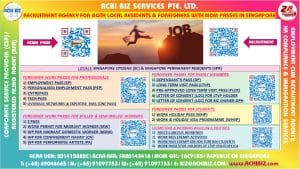 Recruitment Agency
Recruitment Agency
At ACHI, we provide a trustworthy & honesty Employment and Recruitment Agency services.
We do the job matching services in Singapore for Singaporeans, Singapore Permanent Residents and all types of applicable work pass holders.
Exclusive job portal is going to be launched soon to serve both the Employers and Employees.
Employees, get ready to switch your career through ACHI BIZ to the ever best Employer.
Employers could find the best of best Employees through ACHI BIZ.
Both the Employers and the job seekers are requested to contact us by email until the exclusive portal is launched.
Please refer to Employment Agency services for more detailed information about Work Passes for foreigners.
Fair Employment Practices in Singapore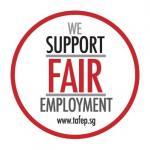
ACHI BIZ SERVICES PTE. LTD. is proud to have taken the “Pledge of Fair Employment Practices”.
Signing the Employers’ Pledge means that we agree with the principles of fair employment and that we will work towards adopting these principles in the management of our human resources.
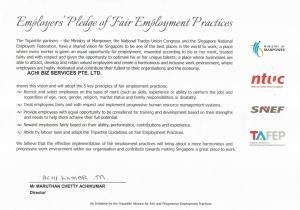 What is tripartism?
What is tripartism?
Tripartism in Singapore refers to the collaboration among unions, employers and the Government. The tripartite partners are the Ministry of Manpower ( MOM ), the National Trades Union Congress ( NTUC ) and Singapore National Employers Federation ( SNEF ).
Tripartism in Singapore
Tripartism refers to the collaboration among unions, employers and the government. It is a key competitive advantage for Singapore. Tripartism has helped boost Singapore’s economic competitiveness, promoted harmonious labour-management relations and contributed to Singapore’s overall progress.
The key tripartite issues include:
- Job re-creation
- Raising the effective retirement age
- Training and upgrading the workforce
- Fair and progressive employment practices
- A flexible wage system
The tripartite partners
The tripartite partners are:
Ministry of Manpower
MOM is responsible for formulating and implementing labour policies related to the workforce in Singapore. It aims to develop a globally competitive workforce and a great workplace, for a cohesive society and a secure economic future for all Singaporeans.
The National Trades Union Congress (NTUC)
NTUC is national confederation of trade unions in the industrial, service and public sectors in Singapore. NTUC’s objectives are to help Singapore stay competitive and workers remain employable for life; to enhance the social status and well-being of workers; and to build a strong, responsible and caring labour movement.
NTUC’s vision is to be an inclusive labour movement for all collars, all ages and all nationalities.
NTUC is at the heart of the Labour Movement, which comprises 60 affiliated unions, one affiliated taxi association, 12 social enterprises, five related organisations and over 780,000 3-Gen members.
The Singapore National Employers Federation (SNEF)
SNEF was established in 1980. SNEF is a trade union of employers dedicated to preserving industrial harmony and helping employers achieve excellence in employment practices, thereby enhancing productivity, competitiveness as well as the quality of their employees’ work life. With the support of over 3,000 corporate members, SNEF is an active player in facilitating the tripartite partnership among the Government, employers and unions.
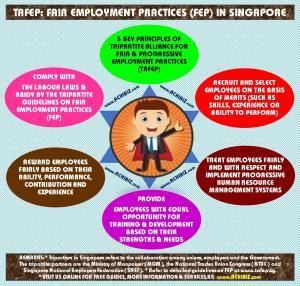 Fair Employment Practices in Singapore
Fair Employment Practices in Singapore
The 5 key principles of Fair Employment Practices are:
- Recruit and select employees on the basis of merit (such as skills, experience or ability to perform the job), regardless of age, race, gender, religion, marital status and family responsibilities, or disability.
- Treat employees fairly and with respect and implement progressive human resource management systems.
- Provide employees with equal opportunity to be considered for training and development based on their strengths and needs to help them achieve their full potential.
- Reward employees fairly based on their ability, performance, contribution and experience.
- Comply with the labour laws and abide by the Tripartite Guidelines on Fair Employment Practices.
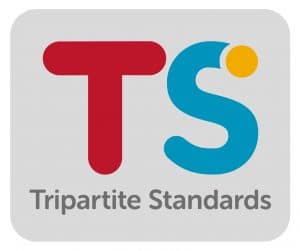 Tripartite Standards
Tripartite Standards
The Tripartite Standards is an initiative that identifies and recognises employers who have implemented
progressive employment practices. It specifies verifiable and actionable practices in key areas of employment
that organisations are committed to and implement at workplaces.
The Tripartite Standards complement laws, Tripartite Guidelines and Advisories to raise employment standards
and build better workplaces.
We (ACHI BIZ SERVICES PTE. LTD.) are a proud adopter of the Tripartite Standards.
An initiative that distinguishes Singapore’s progressive employers.
|
Adapted Standards |
Details of adapted Tripartite Standards |
Tripartite Standards |
|
Flexible Work Arrangements (FWA) |
|
Recruitment Practices |
|
Contracting with Self-Employed Persons |
|
Work-Life Harmony |
|
|
Note:
|
|
Detailed guidelines by Tripartite Alliance
You can refer to the below links for more detailed guidelines set by Tripartite Alliance for Fair and Progressive Employment Practices (TAFEP) for Fair Employment Practices in Singapore:
Source For Guidelines on Fair Employment Practices is from MOM & TAFEP.
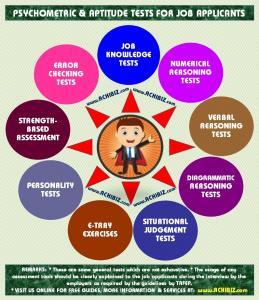 Aptitude & Psychometric Tests For Job Applicants
Aptitude & Psychometric Tests For Job Applicants
Definition:- What are aptitude tests?
Aptitude tests verify candidates ability to acquire fresh knowledge and their general reasoning prowess. These tests were designed to quantify candidates mental processes like working memory, attention span, logical reasoning, and comprehension. Usually, there is no previous knowledge required for passing these tests, except while sitting numerical reasoning and mechanical reasoning where candidates are expected to demonstrate a standard understanding of mathematics and physics.
Definition:- Psychometric Test
Psychometric tests can be used as part of the recruitment and selection process by employers to assess your ability in specific skills (eg, verbal, numerical and diagrammatical reasoning) or to find out about your personal qualities by using personality questionnaires.
Generally what are the different types of aptitude tests?
There are a number of different tests out there in the job markets, but the most common ones are:
Job knowledge tests:
Job knowledge tests, sometimes referred to as achievement or mastery tests, typically consist of questions designed to assess technical or professional expertise in specific knowledge areas. Job knowledge tests evaluate what a person knows at the time of taking the test.
 Numerical reasoning tests:
Numerical reasoning tests:
Numerical reasoning tests demonstrate your ability to deal with numbers quickly and accurately. These tests contain questions that assess your knowledge of ratios, percentages, number sequences, data interpretation, financial analysis and currency conversion.
Verbal reasoning tests:
Verbal reasoning is the ability to understand and logically work through concepts and problems expressed in words. … Some tests will have longer passages of text to read through and multiple questions per passage. Others may have very short passages, but only one or two questions on each.
Diagrammatic reasoning tests:
Diagrammatic Reasoning psychometric tests are commonly used to assess candidates, along with abstract reasoning tests. As the name suggests, such tests involve objects (diagrams) such as a series of pictorial questions with little or no words or numbers.
Situational judgement tests:
Situational judgement tests (SJTs) or Inventories (SJIs) are a type of psychological test which present the test-taker with realistic, hypothetical scenarios and ask the individual to identify the most appropriate response or to rank the responses in the order they feel is most effective.
E-tray exercises:
An e–tray exercise is a simulated computer based exercise used as part of an assessment centre. The exercise requires you to read and respond to a series of messages presented in an email inbox. The exercise is based around a fictional work/business scenario where you have been given a particular job role.
Personality tests:
A personality test is an assessment used by employers to help find a candidate whose character traits are best suited for a specific position. The pre-employment testing is designed to reveal particular aspects of a candidate’s personality and estimate the likelihood that he or she will excel in such a position.
Strength-based assessment:
Strength-based assessment looks at the combination of what people are good at and what they enjoy doing. It focuses on the specific areas which motivate, naturally enthuse and excite candidates.
Error Checking Tests:
Error checking tests assess a candidate’s ability to identify errors in data sets and assess the correctness of information. They are also known as Data checking tests. Candidates are required to complete error checking tests under timed test conditions.
Why do employers use aptitude tests?
Employers want to assess your cognitive and social powers which allow companies and organisations to streamline the recruitment process by finding the right candidates sooner.
Based on the answers to these tests employers can effectively build a personal profile and see if it matches with the company’s culture and the role in particular. The profiles are further used in providing an overview of how the person might perform and behave in the workplace.
 How to pass psychometric tests?
How to pass psychometric tests?
Practice, practice, practice. The more you do them, the more you’ll become familiar with the different types of tests and the more you’ll refine your skills.
If you’re unsure of certain questions or feel you have consistent weaknesses, look at the explanations and see we work out the answer. Often breaking down complicated questions into little steps can make it seem so much easier.
However, ensuring that psychometric tool or other types of tests used are relevant to the job. The usage of any assessment tools should be clearly explained to the job applicants during the interview by the employers as required by the guidelines by Tripartite Alliance for Fair and Progressive Employment Practices (TAFEP).
| Source of Information, Guidelines, Compliance, Laws, Rules & Regulations is from the relevant authorities of Singapore | |
| Details of Source | Name of Authorities |
|
|
|
|
|
|
|
|
|
|
|
|
|
|
 24/7/365
24/7/365



